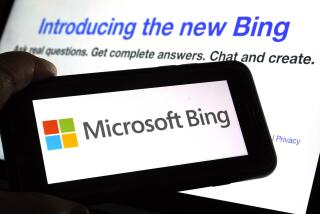Dousing the Flames on the Net
- Share via
Date: 22 Feb 1995 11:05:17 EST From: Outraged 54321.1234@reader.flame To: Michael Schrage schrage@latimes.com Subject: Your Tiny Brain
Just how stupid are you? No, don’t respond. I know how stupid you are because I read your column. It couldn’t be more wrong. I can’t believe you actually get paid for writing this junk. If you had bothered to do ANY research AT ALL, you wouldn’t have written something so filled with half-truths and inaccuracies. Is your editor also as stupid and lazy as you are? Or has he just given up trying to edit your drivel? I guess it’s too much to expect that a newspaper would actually try to publish anything that remotely resembles the truth. From now on, please try to write about something you know--that way, your column won’t have to appear so often. Have a nice day! :-)
In cyberspace, you get to hear everybody scream. Constantly.
Almost without exception, “newbies”--that is, newcomers to the Internet--express shock at the vitriolic quality of discourse that frequently ricochets across their screens. They’re appalled when they actually get “flamed”--that is, textually roasted--for sending messages someone else thinks are dumb, inappropriate or a violation of netiquette. Are they but tender, squeamish souls who shouldn’t be venturing alone out onto the big, bad Net? Or is the conversational sensibility of today’s cyberspace rapidly coming to resemble an on-line parody of talk radio on a bad day?
If you go on-line today, you will get flamed. Count on it. Casual rudeness on the Net is practically a norm and too many Netizens--old-timers and newbies alike--take a little too much pride of authorship in the searing quality of their flames. The very nature of the Network--its blend of global reach and intimate connection, its novel mixture of real-time and asynchronous communications, its ability to convey fighting words beneath the benign veneer of a computer screen--has made electronic mail a terrific medium for insults.
As Sara Kiesler, a Carnegie-Mellon University professor who has extensively studied e-mail interactions observes: “When social definitions are weak or nonexistent, communication becomes unregulated. People are less bound by convention, less influenced by status and unconcerned with making a good appearance. Their behavior becomes more extreme, impulsive, self-centered. They become, in a sense, freer people.”
Translation: It’s a heckuva lot easier to be rude on the Net.
And that’s what’s so intriguing about it: This medium creates new contexts for rudeness. To wit, most people wouldn’t dream of calling someone who they’d never met and leave an answering machine message along the lines of, “Hey, putz! . . . You’re a moron.” By contrast, scores of people don’t hesitate to type up and--without the slightest trace of self-consciousness or self-awareness--send an e-mail message that literally says much the same thing. Like people who turn into maniacs when they get behind the wheel of a car, some folks just can’t wait to fire up their PCs and start flame-throwing.
Now, admittedly, there may be certain virtues to logging on-line and being virtually told 20 or 30 times a week that you’re an idiot. It forces a sense of humility. Personally, it gives me the wonderful opportunity to relive my childhood years. But then, it is startling to observe how seemingly intelligent people--and they have to be at least intelligent enough to operate a personal computer--will send off crude messages that will do little more than irritate and annoy. Just what are these people thinking?
Now, the fashionable technical approach these days to this surge of e-mail meanness is to filter it out. On-line services like Prodigy and America Online have human and software “censors” that monitor the bulletin boards and help remove inappropriate talk. Many organizations now have “bozo filters” that let people screen e-mail and on-line comments from folks they’re sick and tired of. No doubt some software entrepreneur will make a fortune selling filters that let people customize who and what they’re going to screen out of their electronic mailboxes. In his terrific cyberpunk novel, “Earth,” David Brin postulates an Uber -filter he calls a “courtesy worm.”
“It is a guerrilla program--an illegal virus--that goes around targeting people who are too angry and vituperative on The Net,” he writes. “Attracted by unsavory, scatological and ad hominem phrasing, the worm gets into the flamers’ system and announces: ‘Hello. You have been infected by the program, Emilypost, because your presence on The Net is impinging upon the rights and enjoyment of others. . . . We suggest you try behaving in a more grown-up manner. If you don’t, you will soon discover certain features of Emilypost which . . . ‘
Here’s a more modest approach. Much as we have spell-check software to catch our spelling mistakes before we send out a document, we should have “Flamecheck” software designed to catch our rudeness--intentional and unintentional. Messages that have the word stupid or idiotic or pea-brained in them, for example, would trigger Flamecheck to ask, “Are you sure you really want to send this?”
If the response was positive, Flamecheck would flash: “Are you sure?” before the message was sent. Similarly, Flamecheck might make it difficult for you to immediately respond to a message with a hostile phrase to assure you don’t unthinkingly counter-flame.
There are all kinds of ways to check an instinctive tendency to flame. What’s wrong with a bit of software to make people a little more self-aware of the messages they are sending? It’s just as important to build filters for the outgoing messages as the incoming ones.
This suggestion is made with the hope it might inspire an on-line service or a telecom software company to embrace it as a design option. Consider this suggestion my small effort to improve the quality of network life and discourse. Whether you like this modest idea or not, could you do me a small favor? Whatever you do, please, don’t write . . .
*
Michael Schrage is a writer, consultant and research associate at the Massachusetts Institute of Technology. He writes this column independently for The Times. He can be reached at schrage@latimes.com by electronic mail via the Internet.
More to Read
Sign up for our Book Club newsletter
Get the latest news, events and more from the Los Angeles Times Book Club, and help us get L.A. reading and talking.
You may occasionally receive promotional content from the Los Angeles Times.










